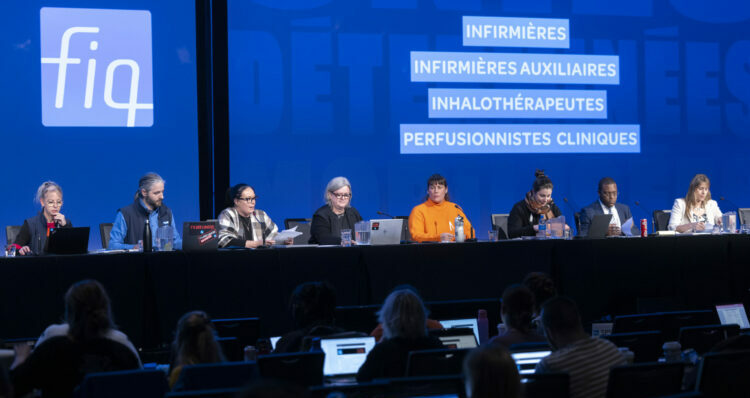
Bill 15: a disaster in the making for the health and social services network
At the Federal Council, the delegation took the time to discuss the draft of Bill 15, which became Bill 15 after being passed under a gag order a few days later. This major reform will fundamentally transform managing the health and social services network, bringing all institutions under the aegis of the Santé Québec agency, making this new agency the sole employer. Bill 15 will result in greater centralization of decision-making – the antithesis of local management, the merging of seniority lists, an unprecedented opening up to privatization and an anti-feminist vision of the health network.
We believe that its implementation will be a disaster for the health and social services network. Since the bill was tabled in March 2023, all the public network labour organizations, the APTS, CSN, CSQ, FIQ, FP–CSN, FSSS–CSN, FSQ–CSQ, SCFP, SPGQ and SQEES–FTQ, worked together with citizen and community organizations to counter the negative consequences of the Dubé reform. This mobilization will continue despite Bill 15 being passed.
Impacts on respiratory therapists and clinical perfusionists
Only a few days before the reform was passed, the government announced it had made amendments to increase the number of classes of personnel from 4 to 6 and would move respiratory therapists and clinical perfusionists from Class 1 to Class 6.
As soon as the FIQ heard the news, it conducted a wide-ranging campaign with the three opposition parties, associations of medical specialists and the professional orders in order to get Minister Dubé to back down, arguing in favour of maintaining unity within the care team. Unfortunately, Minister Dubé turned a deaf ear to our arguments and his government decided to go it alone.
A petition was also launched at the National Assembly to maintain these job titles in Class 1 and although Bill 15 has been passed, we will continue to mobilize to get the government to back down.
It is clear for the delegation that respiratory therapists and clinical perfusionists belong with the FIQ. They work in close collaboration with nurses and licensed practical nurses; the organization of their day-to-day work and their tasks linked to direct patient care are complementary.
Over the coming months, the different FIQ working groups, with a mandate to evaluate the impacts of the Dubé reform on the structures and functioning of the Federation, will also need to examine this change of class, to ensure that the respiratory therapists’ and clinical perfusionists’ rights and working conditions continue to be as well defended as possible.